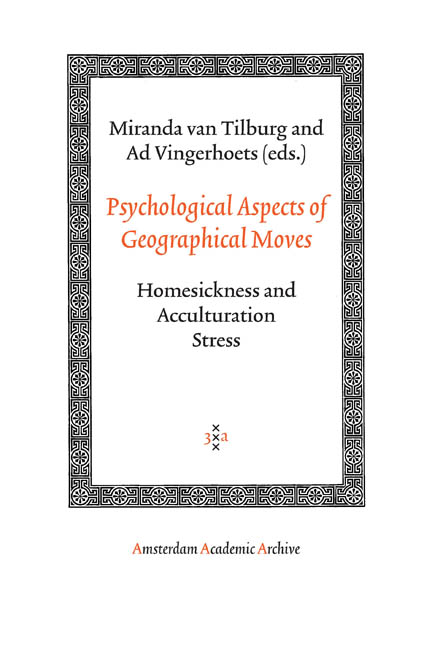Book contents
- Frontmatter
- Preface
- Contents
- Contributors
- 1 The Homesickness Concept: Questions and Doubts
- 2 Culture Shock, Homesickness, and Adaptation to a Foreign Culture
- 3 The Psychological Context of Homesickness
- 4 Geographical Moves and Psychological Adjustment
- 5 Homesickness and Acculturation Stress in the International Student
- 6 Psychological and Psychosocial Adjustment of Migrants: Families in a Changing Environment
- 7 Individual Differences in Acculturative Stress Reactions: Determinants of Homesickness and Psychosocial Maladjustment
- 8 The Cry for the Lost Placenta: Cultural Bereavement and Cultural Survival among Cambodians who Resettled, were Repatriated, or Stayed at Home
- 9 Children's Coping with Homesickness: Phenomenology and Intervention
- 10 Homesickness after Relocation during Early Adolescence
- 11 Personality, Temperament, and Homesickness
- 12 Homesickness, Personality and Personality Disorders: An Overview and Therapeutic Considerations
- 13 Health Issues in International Tourism: The Role of Health Behavior, Stress and Adaptation
- 14 Development of Psychopathology in International Tourists
- Miscellaneous Endmatter
12 - Homesickness, Personality and Personality Disorders: An Overview and Therapeutic Considerations
Published online by Cambridge University Press: 23 January 2021
- Frontmatter
- Preface
- Contents
- Contributors
- 1 The Homesickness Concept: Questions and Doubts
- 2 Culture Shock, Homesickness, and Adaptation to a Foreign Culture
- 3 The Psychological Context of Homesickness
- 4 Geographical Moves and Psychological Adjustment
- 5 Homesickness and Acculturation Stress in the International Student
- 6 Psychological and Psychosocial Adjustment of Migrants: Families in a Changing Environment
- 7 Individual Differences in Acculturative Stress Reactions: Determinants of Homesickness and Psychosocial Maladjustment
- 8 The Cry for the Lost Placenta: Cultural Bereavement and Cultural Survival among Cambodians who Resettled, were Repatriated, or Stayed at Home
- 9 Children's Coping with Homesickness: Phenomenology and Intervention
- 10 Homesickness after Relocation during Early Adolescence
- 11 Personality, Temperament, and Homesickness
- 12 Homesickness, Personality and Personality Disorders: An Overview and Therapeutic Considerations
- 13 Health Issues in International Tourism: The Role of Health Behavior, Stress and Adaptation
- 14 Development of Psychopathology in International Tourists
- Miscellaneous Endmatter
Summary
Definition
Homesickness can be described as a depression-like reaction to leaving a familiar environment, characterized by ruminative thoughts about home and the desire to go back to the familiar environment. Dijkstra and Hendrix (1983) define homesickness as “a for humans normal state of being, characterized by a depressed mood, physical complaints and a ruminative thinking about the familiar environment and/or familiar people.”
It is important to make a distinction between homesickness occurring when being separated form the home situation as a state and as an enduring vulnerability to react with grief each time when being away from the familiar environment. Verschuur et al. (2004) studied the association of both conceptualizations with related concepts, such as anxiety, depression and anger. The latter conceptualization can rather be considered as an enduring trait and does not specifically refer to actual feelings of depression. We compared these two conceptualizations of homesickness in a random sample from the Dutch population (n=485) by assessing their uni- and multivariate associations with anger, anxiety, depression, and anxiety-sensitivity. Both conceptualizations of homesickness were associated with anxiety and depression and with (the externalization of) anger. No association was found between internalization of anger or control over internalized and externalized anger for either conceptualization of homesickness. The pattern of multivariate associations between homesickness and these emotional correlates was similar for both conceptualizations, although homesickness as a state appeared to have a stronger association with depression, whereas the tendency to develop homesickness showed a particularly strong association with anxiety. It is concluded that homesickness can be considered as a mixed emotion of anxiety and depression (“Cothymia”) but that depression is more characteristic of homesickness as a state, whereas anxiety is more important if homesickness is conceptualized as an enduring tendency.
In addition, it is important to make a distinction between homesickness as a rather normal and highly prevalent emotional reaction to the stress of adaptation to a new environment and a more pathological form leading to a severe state of depression and dysfunctioning. Such a distinction is similar to the one that can be made between normal and pathological mourning. The intensity of the experience of homesickness may vary widely, as reflected in the number of symptoms and the way it may manifest itself.
- Type
- Chapter
- Information
- Psychological Aspects of Geographical MovesHomesickness and Acculturation Stress, pp. 179 - 196Publisher: Amsterdam University PressPrint publication year: 2006

